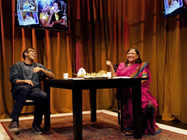Produced by Why Not Theatre.
Ravi Jain is a theatre force of nature. Educated internationally, he is a celebrated actor, director, educator, producer, arts activist and the artistic director of Why Not Theatre. His recent play SPENT played in Toronto, Ottawa, the Edinburgh Festival and in Mumbai. He was invited to do a workshop in India which laid the ground work for this play.
Asha Jain is Ravi’s mother. She is not a theatre professional, but she is a natural. Her main job, besides taking care of her husband and older son, is to get Ravi settled and married. Mrs. Jain and her husband considered Ravi’s trip to India as a perfect opportunity to send the word out to various families with eligible young woman, and try and arrange his marriage.
Ravi was mortified. He told them he wanted to get married, eventually, but not now. He had formed his own theatre company and was busy with that. There were his other theatre projects. It would be unfair to both his possible future wife and him to be distracted by marriage. And besides, he wanted to pick his own wife and not be involved in an arranged marriage.
His mother reminded him that her marriage to his father was arranged. She had only one hour alone with him to get to know each other. They were engaged the next day and married soon after that. The day after I saw the show would be their 38th wedding anniversary.
She gave up her dream of starting a school/orphanage in India when she went with her new husband to Canada where she knew no one and had no family. She gave birth to two sons—first Ravi’s brother and then Ravi.
A BRIMFUL OF ASHA is a retelling of the story of Ravi Jain’s trip to India, his parents’ many and various plans to find him a nice girl to marry, and Ravi’s many and various ways of dealing and avoiding all the interference.
It is also a kind of debate between him—who wants to live his own life and find his own wife but still be respectful to his parents and their traditions—and his mother, Asha, who believes in tradition; who wants Ravi settled and feels it is her duty to find him a wife to accomplish that—and of course to prove him wrong in his thinking.
What is particularly charming about this charming show (with a hint of spicy heat) is the joy that mother and son have in each other’s company. They both greet the audience as we file in past them. He, smiling a warm smile that would melt icebergs; introducing himself; shaking hands with everyone who passes by; inviting everyone to take a samosa (there is a plate of them on the table); and proudly introducing his mother; protective of her; she, also smiling, wearing a beautiful sari, greets all who pass by warmly, lots of hand shakes.
When the show starts they both sit at a table, two cups of tea and a tea pot are on the table. He will replenish his mother’s cup and then his own during the show. Ravi introduces the premise. His mother has her turn saying she is not an actress, so we should be understanding if she forgets her lines. (She forgets nothing—she is a mother after all).
There is easy banter between the two. Ravi details the various places he went on his trip to India; how his parents seemed to be there every step of the way; the various young women he met, all arranged, out of respect for his parents; his frustration at this; and finally his anger at the lengths to which his parents were going to meddle in his life.
In a startling change of easy going pace, there is a scene that is a screaming/crying match on the phone; Ravi screaming, his mother crying. To re-enact this phone call, they had to relive it. Ravi in the basement of the family home, on his cell-phone doing his part and his mother upstairs trying to recreate her crying. She was so realistic, he said, that he rushed upstairs to see if she was ok. Of course she was. She was only acting.
The premise is interesting—a melding of two worlds; his modern, contemporary world in which adults should live their own lives and pick their own partners; and her traditional world in which parents arrange their children’s lives and marriages.
There are some jabs at his choice of profession (the theatre). But the fact that he has travelled the world learning and working would surely make them proud, after all his mother is in one of his shows. Asha is not above using a little emotional blackmail—she says she will not live long and his being settled and married will help her leave this world a contented mother.
She doesn’t define what she calls ‘settled’, nor does he ask what it is about his happy life that would suggest he isn’t settled.
A BRIMFUL OF ASHA is a sweet show about an age old problem that is part of every culture everywhere—getting the kids settled with good marriages that they want to help arrange, and the kids opposing that idea. It stars two wonderful performers who obviously love and respect each other to bits.
A BRIMFUL OF ASHA plays at the Tarragon Extra Space until February 19.
